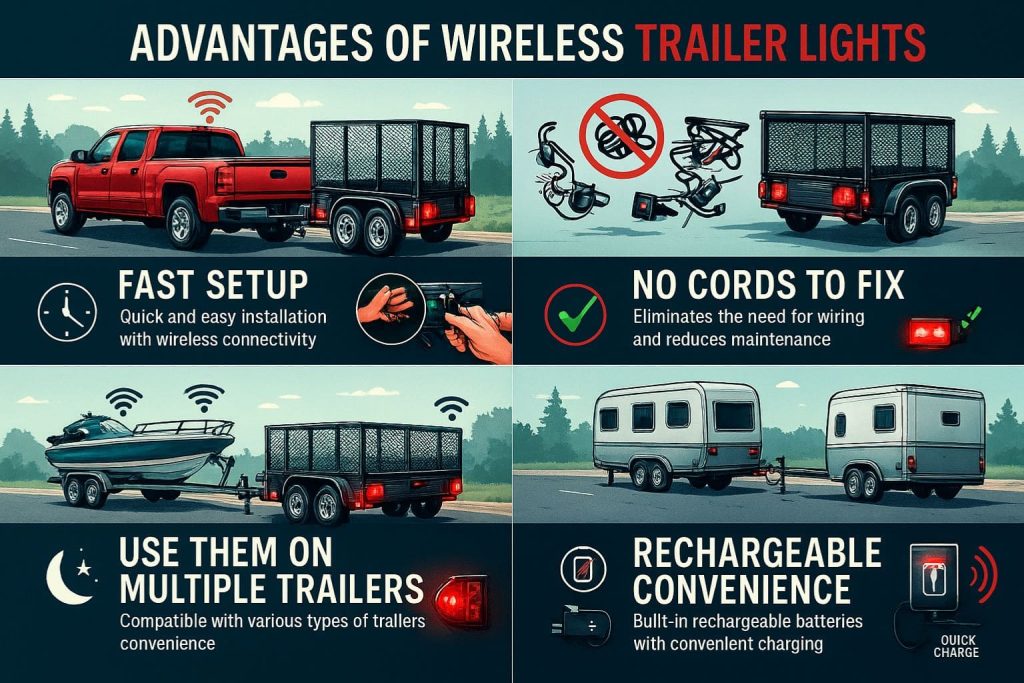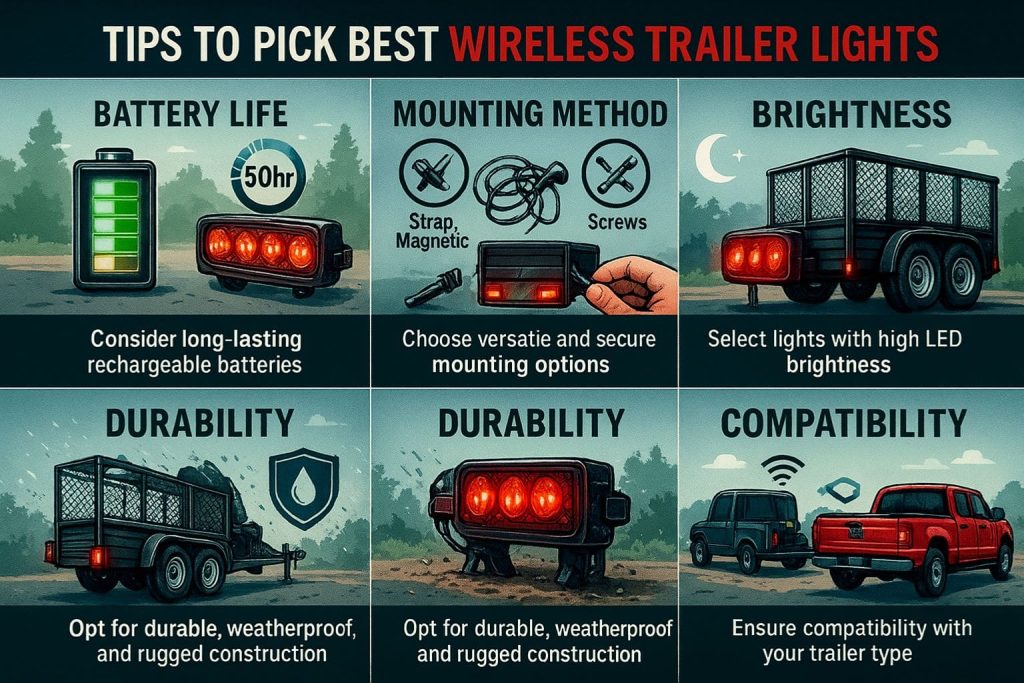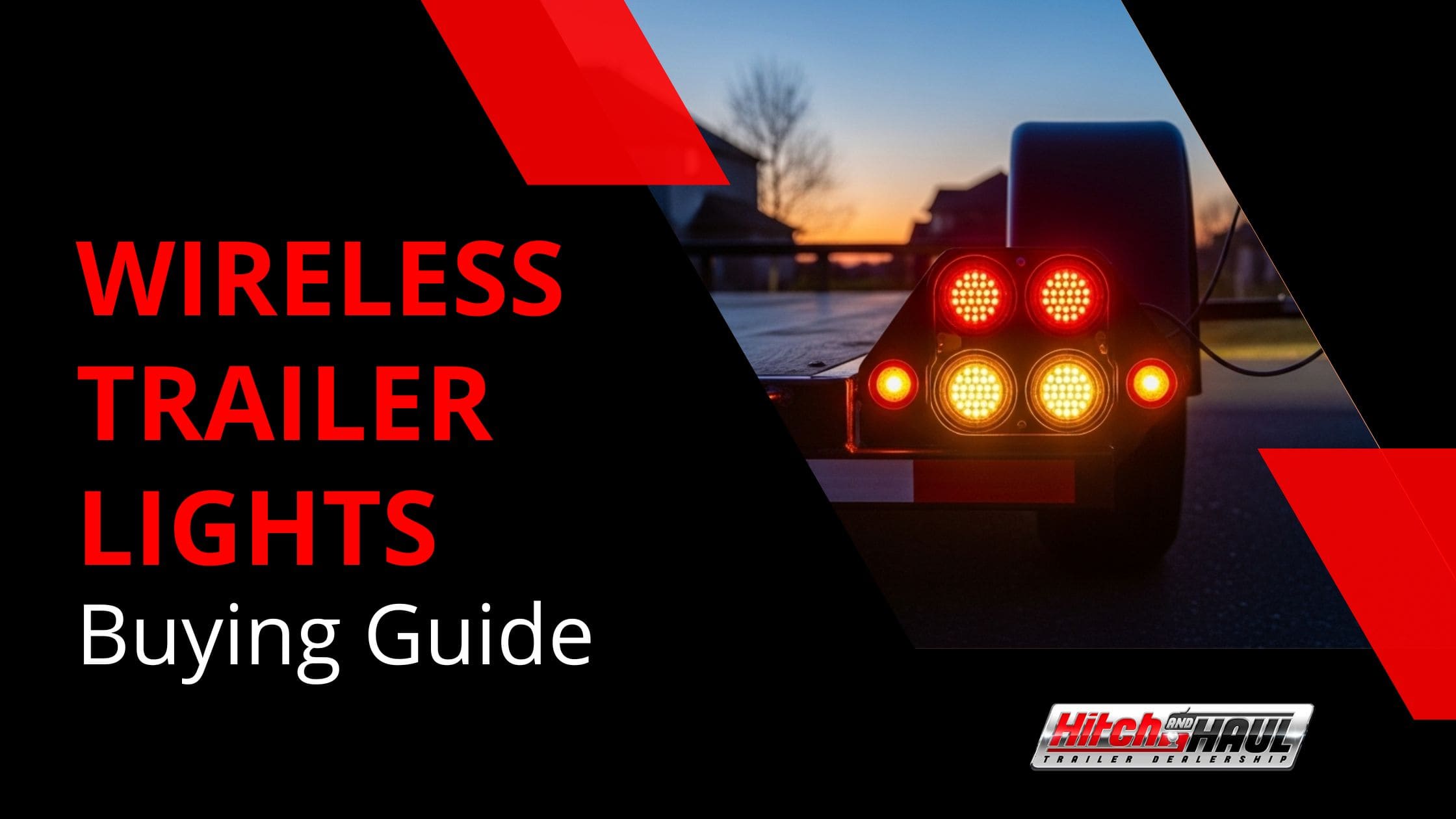If you’ve ever towed a trailer, you know the pain: cords that tangle, plugs that corrode, or wires that drag on the ground until they spark. Traditional trailer lights work – when they want to – but they’re a constant headache.
That’s why more and more people are switching to wireless trailer lights. No messy wiring. No rewiring after a cord breaks. Just mount the lights, plug in the transmitter, and hit the road.
Whether you’re pulling a boat, hauling farm equipment, or towing a utility trailer, wireless lights save time and frustration. This guide will show you what they are, how they work, which types are out there, and how to pick the best trailer lights for your setup.
What Are Wireless Trailer Lights?
Think of them as your standard trailer lights – brake lights, tail lights, turn signals – but without the cords.
Instead of running wires from your truck to the trailer, wireless lights use a transmitter that plugs into your vehicle. The lights themselves are battery-powered and often attach with strong magnets or brackets.
So you get the same function – visibility, safety, and compliance with the law – but without the wiring hassle.
How Do Wireless Trailer Lights Work?
Here’s the quick version:
- A small transmitter plugs into your truck’s 4-pin connector, 7-pin connector, or even the OBD2 port (depending on the kit).
- The transmitter sends signals wirelessly to the light units on your trailer.
- The lights – usually LED and rechargeable – respond instantly when you brake, turn, or use hazards.
Many kits are magnetic, so you can stick them to the trailer and pull them off when you’re done. Some even come with a remote control or a phone app.
So the answer to “how do wireless trailer lights work?” is: they pair your truck’s signals to portable, rechargeable LED lights without a single cord between them.
Why Go Wireless? The Real Advantages
People love wireless lights in trailers for a few big reasons:
- Fast setup. Stick the lights on, plug in the transmitter, and you’re good to go.
- No cords to fix. You don’t have to mess with wiring every season.
- Use them on multiple trailers. One kit can cover your boat trailer, your utility trailer, and even farm equipment.
- LED brightness. Wireless LED trailer lights shine brighter and last longer than old-school bulbs.
- Rechargeable convenience. Most sets charge with USB or a 12V port.

Bottom line: wireless saves you time and hassle while making towing safer.
The Downsides You Should Know
Nothing is perfect, and wireless kits have a few drawbacks:
- Battery life matters. Forget to charge them and you’re stuck.
- Limited range. Most cover about 100–200 feet, which is fine for normal trailers but not huge rigs.
- Cost. They cost more up front than wired lights.
- Signal interference. Rare, but wireless connections can drop in tough conditions.
If you can live with charging them and paying a bit more, the benefits far outweigh these downsides.
Different Types of Wireless Trailer Lights
Not every kit is the same. Here are the main styles:
- Magnetic wireless trailer lights – Easy on, easy off.
- Rechargeable wireless lights – Built-in batteries, no need for replacements.
- Wireless trailer lights with remote – Lets you check and control functions quickly.
- Wireless trailer lights OBD2 – Plug into your truck’s OBD2 port for quick setup.
- Wireless Bluetooth trailer lights – Some pair with apps for more control.
- Wireless boat trailer lights – Built to handle water and corrosion.
- Wireless LED trailer lights – Energy-efficient, bright, and long-lasting.
If you only buy once, a wireless lights kit with rechargeable LEDs and magnetic bases is usually the best choice.
Where to Buy Wireless Trailer Lights?
You don’t have to look far – these lights are widely available.
- Amazon wireless trailer lights – Biggest selection, with brands like Connix, Hopkins, Agrieyes, and Vevor.
- Wireless trailer lights AutoZone – Easy pickup if you need a set today.
- Wireless trailer lights Harbor Freight – Budget options like Kenway.
- Wireless trailer lights Screwfix and Princess Auto – Popular in Canada and the UK.
- Local searches. “Wireless trailer lights near me” usually points to farm supply stores, trailer shops, or big-box retailers.
Popular Brands to Watch
A few names come up over and over in reviews:
- Connix wireless trailer lights – Known for their OBD2 plug-and-play systems.
- Hopkins wireless trailer lights – A solid, reliable choice.
- Agrieyes wireless trailer lights – Built tough for farm use.
- Kenway wireless trailer lights – Budget-friendly, often at Harbor Freight.
- Vevor wireless trailer lights – Affordable kits with rechargeable options.
Each has its own strengths, but all solve the same problem: ditching the wires.
How to Pick the Best Lights?
Here’s what you should focus on when choosing:
- Battery life. Look for at least 8–10 hours on a charge.
- Mounting method. Magnetic is the easiest if you move lights between trailers.
- Brightness. LED wireless trailer lights are brighter and safer than old bulbs.
- Durability. Waterproof and dustproof is a must.
- Compatibility. Make sure your kit works with your truck’s connector (4-pin, 7-pin, or OBD2).

If you want all-around convenience, rechargeable magnetic LEDs are hard to beat.
Best Uses for Wireless Trailer Lights
These lights aren’t just for one kind of trailer. Here’s where they shine:
- Boat trailers – No corroded wires when submerged.
- Farm equipment – Move the kit from one machine to another.
- Construction trailers – Quick setup on job sites.
- Temporary towing – Great for rentals or borrowed trailers.
Basically, if you tow more than once in a while, wireless pays off fast.
Safety and Care Tips
You want your lights to last – and you want to stay legal and safe. Here’s how:
- Charge them after every trip so they’re always ready.
- Test brake lights, signals, and hazards before hitting the road.
- Keep the charging ports clean and dry.
- Store indoors when not in use to protect the batteries.
- Use waterproof kits if you’re trailering boats.
A few habits keep your lights reliable.
Conclusion: Are They Worth It?
So – are wireless trailer lights worth the investment? For most people, yes.
They save time, work across multiple trailers, and keep you visible without the headache of cords and wiring repairs. The only real catch is remembering to charge them and paying a little more up front.
If you’ve had enough of broken wires and unreliable plugs, switching to wireless is one of the smartest trailer upgrades you can make.
Frequently Asked Questions
1. What are wireless trailer lights and how do they work?
Wireless trailer lights replace the need for messy wiring. A transmitter (plugged into your vehicle’s 4-pin, 7-pin, or OBD2 port) sends signals to rechargeable LED light units mounted on your trailer.
2. Are rechargeable wireless trailer lights reliable?
Rechargeable wireless trailer lights are dependable as long as you keep them charged. Battery life typically ranges from 6 to 20 hours.
3. Which are the best wireless trailer lights for everyday use?
The best wireless trailer lights are rechargeable LED kits with magnetic bases. They’re easy to mount, bright, and versatile across different trailers.
4. How do magnetic wireless trailer lights attach?
Magnetic wireless trailer lights use strong bases to stick securely to metal surfaces—no drilling or hardware needed.
5. Can I use wireless boat trailer lights underwater?
Yes, but you’ll need waterproof models. Wireless boat trailer lights are built to resist corrosion and handle submersion.









Leave a Reply